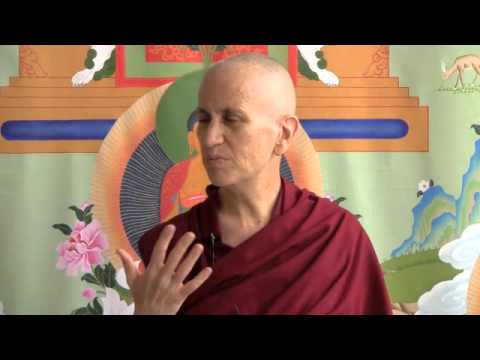Making life meaningful
This talk was given during the White Tara Winter Retreat at Sravasti Abbey.
- Setting priorities
- Developing the six far-reaching practices
- Having a bodhicitta motivation
- Helping others, helping ourselves
White Tara Retreat 35: What are far-reaching practices (download)
We’re in the middle of making a strong determination to use our life in a meaningful way to transform our mind. So that’s really setting our priorities, knowing what direction we’re going in, making some determination to do it. We’re doing all this in the presence of Arya Tara who’s on our head so we can’t just say, “Well, I’ll live my life in a meaningful way,” to the Buddha and then go out and do whatever we want. It’s like you should have some integrity about it and so say this like you mean it. That doesn’t mean we have to be perfect, but we’re stepping in the right direction and Tara is our witnesses that we’re making a decision to do that. We’re also making a decision to develop love, compassion, and the six far-reaching practices. After we’ve done all this purification and eliminated the obstacles to our lives, then we should do something useful for others with our lives, shouldn’t we? Otherwise there’s no sense in having a long life. Doing something useful depends on first generating love and compassion and then engaging in the far-reaching practices.
Love, compassion, six far-reaching practices
Love we talked about before: it’s the wish for sentient beings, ourselves and others, to have happiness and its causes. Compassion is the wish for all sentient beings to be free of suffering and its causes. Having those things in our mind, we want to become a Buddha in order to best be able to enact love and compassion and their causes and make a difference in the lives of ourselves and others. The practices to help us become a Buddha are the six far-reaching practices: far-reaching generosity, far-reaching ethical conduct, far-reaching fortitude or patience, far-reaching joyous effort, far-reaching meditative stabilization, and far-reaching wisdom. Now, I said, “far-reaching” before each one of those. Why? Because all six of those are good to do anyway, but if we make them far-reaching practices they reach beyond samsara, they reach to the farthest shore, to nirvana.
Bodhicitta motivation
In the case, say with generosity, what we’re doing is making sure we have a bodhicitta motivation when we do it, and we also meditate at the end that ourselves (as the person that is acting) and the object that we gave or the person that we gave to, the act of giving, that all these things are dependent on each other and that all of them are empty of inherent existence. These two factors: (1) doing the action with bodhicitta, and (2) contemplating dependent arising and emptiness at the end, are what make these far-reaching practices. This is what make them different from regular generosity or regular ethical conduct and so forth, is that we’re making them special because of our motivation and because we’re viewing them as how they really exist. That’s really engaging the far-reaching practices. The six far-reaching practices is a whole other teaching we won’t go into right now.
We’re also making a determination to act in ways that benefit ourselves, others, and the environment. This really makes us think, “What does benefitting others mean?” As I’ve said many times, benefitting others does not always mean doing what they want us to do, okay? Really to benefit others we need a lot of wisdom to discern what, in the long run, is benefit from what is harm. We really need to think about this a lot and not just, “Oh! Somebody wants this. Let’s go do it.” I mean, with some things it’s really simple, “Please help me carry this.” Well, please, don’t ponder that for five years. Go help them! But if we’re talking about very sophisticated ways of helping sentient beings in the long-term then we really need to think what is help and what is enabling a fault of theirs to continue. It needs a lot of wisdom.
We want to help others and we want to help ourselves. This similarly requires a lot of thought. What does it mean to help ourselves? Again, helping myself doesn’t mean I give myself everything I want because sometimes what my attachment wants and what my anger wants aren’t so good for me. So really thinking, “How do I take care of myself? What do I really need to do?” Develop some thought.
The environment
Similarly, taking care of our environment is important because it’s one of the things we’ll be leaving behind ourselves for future generations. I think that if the Buddha were alive today he would be giving many teachings on caring for the environment and how that relates to opposing our attachment, opposing our laziness, and so forth. We’re all very much for helping our environment, but when it gets inconvenient to help our environment our idea kind of goes out the window. When we want something from the store, we go out and get it. Then we come home and talk about how all these people are driving their vehicles when they could carpool, use public transportation, or minimize their trips. But when we want something, we just go out and get it.
We really have to look at how caring for the environment really touches some of our sensitive points about getting what we want, when we want it, and getting it how we want it and so on. Simply because it is inconvenient to wait and do all your shopping at one time (by that time you may have forgotten what you wanted at that moment). You missed the opportunity to give yourself some pleasure at that moment that you don’t even remember now.
Really thinking of our impact on the environment and how to care for it and restraining a lot of our consumerist, materialistic attitudes. Here at the Abbey, for example, with wrapping paper, we don’t buy wrapping paper. We reuse wrapping paper that people have given us gifts in but otherwise if we give a gift it is in a plastic bag that’s also been reused. I think this is the way we should do things if we care about the environment. I mean, now you have more packaging on things than you have content It’s just really kind of silly, isn’t it?
Audience: In far-reaching generosity, is the “object” referring both to the person being given to and the thing being given?
Venerable Thubten Chodron: You know, they’re never really clear on that with generosity—whether the object refers the thing you’re giving or the person you’re giving it to. But in either case, both of them are dependent arising. It probably refers more to the person you are giving it to, but you should think that what you’re giving is also empty.
Venerable Thubten Chodron
Venerable Chodron emphasizes the practical application of Buddha’s teachings in our daily lives and is especially skilled at explaining them in ways easily understood and practiced by Westerners. She is well known for her warm, humorous, and lucid teachings. She was ordained as a Buddhist nun in 1977 by Kyabje Ling Rinpoche in Dharamsala, India, and in 1986 she received bhikshuni (full) ordination in Taiwan. Read her full bio.


